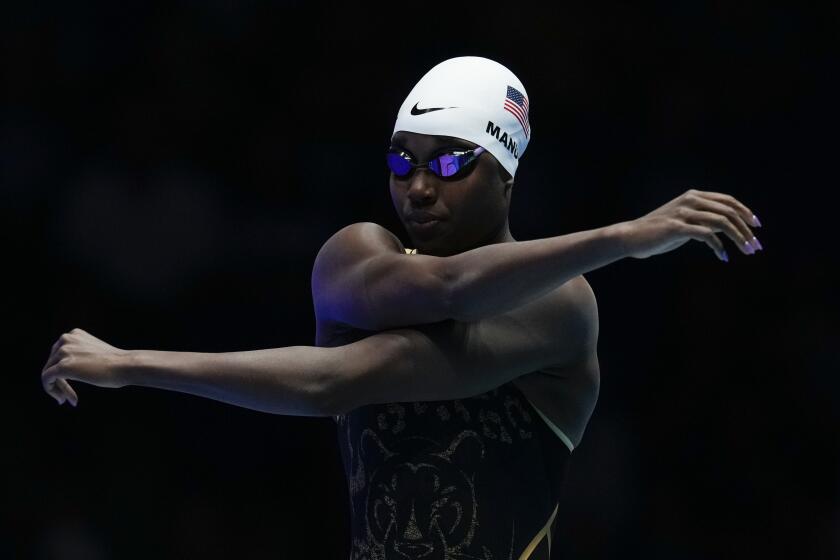Jansen Streaks to Gold, Leaves Failures Behind
Six years to the week after his sister Jane died of leukemia, thrusting him into the center of one of the most enduring Olympic dramas, speedskater Dan Jansen took a victory lap Friday.
With a gold medal draped around his neck and a spotlight focused on him in the otherwise darkened Olympic Hall, Jansen waved to a cheering crowd of 12,000 while carrying his daughter in the other arm. She was born last May, and her name is Jane.
“Our saga started back in Calgary when Dan lost his sister, Jane,” said Jansen’s wife, Robin. “The saga ended today, and we wanted it to end with the new Jane in our lives.”
It ended with an exclamation point. Not only did Jansen, 28, of Greenfield, Wis., win the 1,000 meters in the Winter Olympics, he set a world record, 1 minute 12.43 seconds.
The favorite, Belarus’ Igor Zhelezovsky, was almost three-tenths of a second slower in 1:12.72 and finished second. Russia’s Sergei Klevchenya was third in 1:12.85.
Half an hour after the medal ceremony, Jansen’s post-race news conference was interrupted by a telephone call from President Clinton.
“He said the whole country is proud, and he said he understood a little bit what I’ve been through because his campaigns have been up and down,” Jansen said.
Five minutes later, Hillary Rodham Clinton called to offer congratulations from an airplane over South Dakota. She and daughter Chelsea were inside the Olympic Hall last Monday to witness the most recent of Jansen’s Olympic disappointments in the 500 meters, a race he had been expected to win.
Speedskaters Eric Heiden and Bonnie Blair became widely known in the United States when they won Olympic gold, while others usually toil in obscurity. Jansen’s high profile was a result not of his many accomplishments in the sport but of his failures.
They began under the most unnerving circumstances. Five hours before he was scheduled to compete in the 500 meters in the 1988 Winter Olympics at Calgary, Canada, he learned that his sister, Jane Beres, had died after a lengthy battle with leukemia.
He skated that afternoon because, he said, his sister would have wanted him to, but unable to concentrate, he fell only 10 seconds into the race. Four days later, on the afternoon he would fly to Wisconsin for his sister’s funeral, he competed in the 1,000 and fell again.
In the four years before the next Winter Games, at Albertville, France, Jansen established himself as the favorite in the 500 meters and a medal contender in the 1,000. But constantly reminded in interviews of his sister’s death, he admitted later that he was unable to focus on his races.
He inexplicably hesitated while entering the final curve in the 500 meters and finished fourth. His confidence eroded, he was 26th in the 1,000.
Accepting advice from his coach and a sports psychologist, Jansen adopted a new approach in the months leading to the competition here, deflecting questions from reporters about previous Olympic experiences by saying that he was focusing only on the moment.
But the moment he had Monday in the 500 meters was so reminiscent of others he has had in the Olympics that he could not avoid addressing the past. Searching for an explanation after he had slipped twice in the last curve and finished eighth, he said, “Maybe it’s not meant to be.”
He vowed, however, that he would not quit, and when he arrived Friday at the Olympic Hall, a state-of-the-art arena designed to resemble an upside-down Viking ship, he discovered that the crowd had not quit on him.
Not only were the few Americans here cheering him, so were speedskating fans from other countries where Jansen has become a heroic yet sympathetic figure. The Norwegians waved flags and clanged cowbells for him as if he were one of their own.
When Jansen crossed the finish line in a time that was unlikely to be beaten by remaining competitors, the commentator for Norwegian television screamed, “Yaaaaaaaaaaaaaah!”
Jansen covered his eyes with his hands and began to cry.
So did his wife.
After Monday’s race, Robin Jansen, a devout Catholic, admitted that her faith had been tested.
“As soon as I saw him slip, I said, ‘Why, God? Why again?’ ” she said then. “God can’t be that cruel.”
On Friday, she said her husband’s perseverance had been rewarded.
“I knew when I saw the time that it was going to be first place,” she said. “I was elated. My hands went to the heavens, and I said: ‘Thank you! Thank you! Thank you! He finally got what he deserved.’
“Then I didn’t feel real good. I almost fainted.”
She was taken to the arena’s medical center but released after she calmed down several minutes later, in plenty of time to see her husband in the emotional medal ceremony.
Tears welling in his eyes after he had received the gold medal from Anita DeFrantz of Los Angeles, a member of the International Olympic Committee, Jansen quietly sang the words to “The Star Spangled Banner.” When the music stopped, he looked up and gently saluted.
“That was to my sister, Jane,” he said later. “When I go through hard times, I think about her quite a bit. It’s not a sad feeling anymore. That’s gone. It’s just a feeling that she’s still with me.”
More to Read
Go beyond the scoreboard
Get the latest on L.A.'s teams in the daily Sports Report newsletter.
You may occasionally receive promotional content from the Los Angeles Times.





